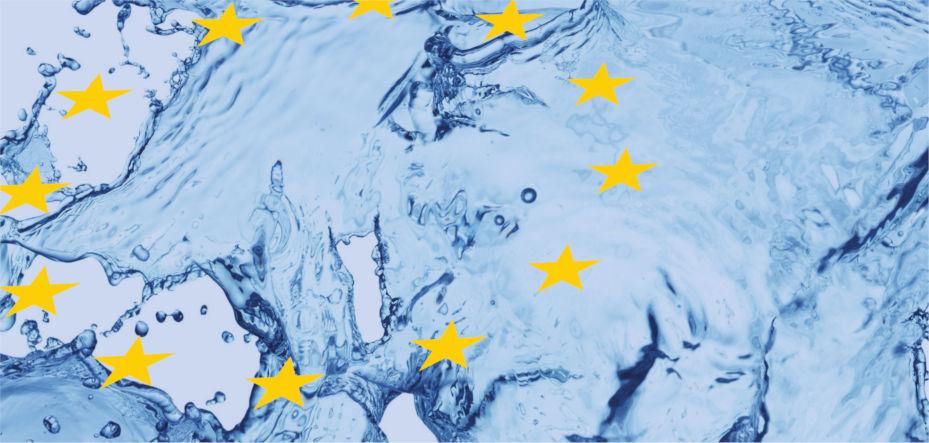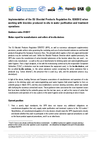Challenge: Approval of in-situ systems under the Biocidal Products Regulation

EU Biocidal Products Regulation also applies for in-situ systems
Since 1st September 2013, the EU Biocidal Products Regulation No. 528/2012 for the first time prescribes the inclusion of disinfectants produced at the point of use and a uniform European approval procedure for these so-called in-situ systems.
The legal framework established by this regulation does not only contain the following clearly stated provision:
„Article 17 Making available on the market and use of biocidal products (1) Biocidal products shall not be made available on the market or used unless authorised in accordance with this Regulation.“
The Biocidal Products Regulation also lays down in detail a two-stage approval procedure consisting of a so-called active substance approval and a subsequent product authorisation. It lays down transition periods and timetables. It also aims to ensure that, only those market participants on the EU internal market who actively participate in the approval of the disinfection systems they place on the market or use, can become active in future.
An important role in the practical implementation of the obligations established by the EU Biocidal Products Regulation is played by so-called regulatory and technical Guidance Documents, which are developed, published and, if necessary, updated by the Commission and the competent authorities of the Member States as well as by the European Chemicals Agency (ECHA).
Advantages of In-Situ Systems
figawa recognised promptly that the EU Biocidal Products Regulation in particular raises numerous questions about the authorisation of so-called in-situ systems and that many details for the successful handling of the time-consuming and costly authorisation procedures were simply unclear and in some cases continue to be so.
At the same time, it is obvious that in-situ systems already play a decisive role in the treatment of water for various purposes and that the importance of these systems will continue to increase both in the central water supply and in the creation of decentralised water cycles.
One of the main advantages of in-situ systems is that disinfection products such as chlorine, chlorine dioxide or ozone are produced at the time and only in the quantity required for the treatment of water.
figawa active in clarification of the regulatory framework for product approval of in-situ systems
Initially, the experts from figawa member companies recognised already in 2013 that the operators of such device-based in-situ systems, who are legally obliged by the Biocidal Products Regulation, have neither the know-how nor the financial capacity to independently undergo the approval and authorisation process under biocidal law.
At the same time, it became clear that an individual approval of around 2 million decentralised in-situ systems is not possible.
Together with its European association Aqua Europa, figawa has therefore made significant contributions to fundamental documents in active dialogue with the responsible authorities:
- CA-March15-Doc.5.1 - "Management of in situ generated active substances in the context of the BPR"
- CA-May15-Doc.5.1.a - "Management of in situ generated active substances in the context of the BPR - The case of ozone"
Among other things, the competent authorities made it clear that the manufacturers of so-called precursors such as sodium chloride for the in-situ production of active chlorine and the manufacturers of corresponding devices are also entitled to obtain approvals under biocide law.
At the same time, this regulatory guideline provides for the bundling of systems and sets new deadlines for the necessary notification of systems.
An alliance of associations for the drinking and pool water industry

At the same time, figawa launched an alliance of leading associations of manufacturers and operators of in-situ systems in April 2015. In addition to figawa, the following associations were jointly involved in the clarification process:
- Bundesverband Schwimmbad & Wellness (bsw)
- Deutsche Gesellschaft für das Badewesen (DGfdB)
- Deutscher Sauna-Bund (DSB)
- Deutsche Verein des Gas- und Wasserfachs (DVGW e.V.)
- European Waterpark Association (EWA)
- Internationale Akademie für Bäder-, Sport- und Freizeitbauten e.V. (IAB)
- Internationale Vereinigung Sport- und Freizeiteinrichtungen (IAKS)
The aim was to actively follow the development of the framework for the authorisation of device-based in-situ systems and to ensure that all operators can continue to operate the approximately 2.5 million in-situ devices for water treatment used throughout Europe in accordance with the requirements of the EU Biocidal Products Regulation, at least until the mandatory product authorisation process has been completed.
Guidance for device manufacturers & operators of in-situ systems
Concurrently, an internal figawa project was set up and financed in accordance with the provisions of the figawa statutes in order to facilitate the necessary project work and, in particular, the involvement of a leading European law firm in this field.
The intensive work of the project group has resulted in several useful documents to assist operators of in-situ systems and device manufacturers in implementing the requirements of the EU Biocidal Products Regulation. This will enable companies in particular to quickly familiarise themselves with the effects and deadlines of the Biocidal Products Regulation.,
More guidance documents only available in German here.
Intensive dialogue with authorities and the EU Commission
The Project Steering Committee, which was also founded in 2015 as part of the project work, also decided to further intensify the dialogue with the authorities, in particular on the design of the product authorisation process for in-situ systems, and to actively develop proposals for a legally compliant and at the same time practicable design of the framework for the product authorisation process for device-based in-situ systems.
At the request of the EU Commission, the proposal prepared by Aqua Europa and ECA A/S,, a consortium also active in this field and based in Denmark, was submitted to the Working Group of Competent Authorities for Biocidal Products in September 2017, which supports the EU Commission in drawing up so-called delegated legal acts under the Biocidal Products Regulation.
The presentation developed for this purpose provides a quick overview of the key points of this proposal.
Based on this and intensive consultations with the competent authorities, a comprehensive regulatory guideline has now been developed, which is expected to be adopted by the Competent Authorities in May 2019:
Numerous written comments and the results of several discussions between Aqua Europa and figawa and the responsible team of the EU Commission have also been incorporated into this status document.
It is also clear, however, that even after the adoption of this guideline, numerous technical questions, such as the necessary bundling of in-situ systems into groups and the fulfilment of data requirements by standards, can only be clarified by means of concrete examples in further proceedings.
ISA Consortium pushes product authorisation process for in-situ generated chlorine
Against the background of the jointly achieved clarifications regarding the regulatory framework conditions for the biocidal products authorisation of in-situ systems in water treatment, numerous figawa members decided in the summer of 2018 to tackle the practical process requirements in a consortium of companies.
The product authorisation of the system "Chlorine generated from sodium chloride by electrolysis" was and is the clear focus for the following reasons:
- The active substance approval procedure preceding the product authorisation process is currently close to its completion. The formal EU approval of in-situ produced chlorine as a biocidal active substance, which is expected in 2019, will at the same time provide for a tight deadline of 2 years during which applications for product authorisation must be prepared and submitted. Active chlorine generated from sodium chloride by electrolysis" will thus be the first device-based in-situ system to require a product approval procedure.
- The proposal developed by figawa for the regulatory design of the product authorisation process provides for the use of standards and norms wherever possible as a basis for compliance with biocidal requirements. The establishment of ISA Consortium is intended to ensure that the exchange of information and cooperation between the ongoing clarification of biocidal requirements and standardisation work takes place as closely as possible.
- With the establishment of ISA Consortium, leading device manufacturers are sending a clear signal that they want to and will ensure that all legal requirements relating to biocides are met in the interest of their customers. This creates the necessary investment security for all customers interested in the use of in-situ systems.
- The development of concrete applications for authorisation and the continuous exchange with the responsible authorities on these applications will in particular facilitate and support the clarification of further open questions regarding the product authorisation of in-situ systems.
With the foundation of ISA Consortium, the involved companies decided to assign figawa Service GmbH with the consortium management and asked it to act as applicant and, if necessary, authorisation holder in the authorisation process.
ISA Consortium currently consists of 15 market-leading European and international companies which manufacture devices and systems for the treatment of water for various applications using the in-situ system "Active chlorine generated from sodium chloride by electrolysis".
ISA Consortium is open to cooperation with other consortia also working on the product approval of this or other biocidal products as well as membership of other companies on the basis of the applicable consortium agreement.
figawa members active in consortia for ozone disinfection applications
Consortia are also already active for other in situ systems. Some figawa members are involved in the consortia EurO3zon and European Ozone Trade Association. They also support and initiate the development of technical standards in the field of water treatment with ozone and contribute their technological expertise to the association's work.


